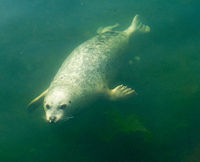Junior Colette Lowry spent her summer vacation in a different way than one might expect. Rather than sleeping in until 12 or 1 in the afternoon, Lowry began her Sunday and Monday mornings at 6:30 a.m. by heading over to the Marine Mammal Center, where she interned at a summer program called Youth Crew, starting in March.
Lowry spent her first hour of volunteer work charting all the special medication and treatment for the animals. Then she made large amounts of elephant seal formula and fish mesh oil, which involved thawing pounds of herring and putting them in a fish grinder. The animals were tube fed and she was responsible for three feedings throughout the day.
“Since the baby [marine mammals] are the ones being fed, they don’t really [understand] what’s happening,” Lowry said. “We would need four people for one animal to sit on them or restrain them so they can’t bite you [and to watch] the other animals in the pen so they don’t bite you [either].”
Lowry was also responsible for cleaning the pens and weighing the animals. She would finish her days 12 hours after her arrival, around 6 p.m. With about 200 to 300 animals to feed, Lowry said it was not an easy task.
“For a portion [of time] during the school year, it was hard because Sundays are usually when I do my homework,” Lowry said. “The elephant seal formula and the fish mesh oil were gross and sometimes if you don’t crimp the tube while you are tube feeding them it can come back out. I don’t like seafood or fish, so that was definitely difficult.”
Lowry felt the most important part of her experience was how it opened her eyes to the impact humans have on the environment, specifically on the ocean and the animals who live in it. She feels this is something more people should be aware of.
“[The Marine Mammal Center emphasizes] how bad and how much pollution is in the ocean,” Lowry said. “Even in Mill Valley where people are generally environmentally conscious I think people tend to forget that about 10 percent of all plastic produced every year ends up in the ocean contributing to the massive gyres [a large system of rotating ocean currents that the trash gets sucked into and makes a sort of trash vortex] in the middle of the ocean. Additionally, a lot of seafood people are eating is produced in really unsustainable ways.”
Lowry believes that people should know it doesn’t take much to help protect marine life. “I’m [strict] with my friends about it now, like if they’re using plastic water bottles,” Lowry said. “One of the easiest environmentally friendly changes someone can make is [switching] from a plastic water bottle to a [reusable] one.”


